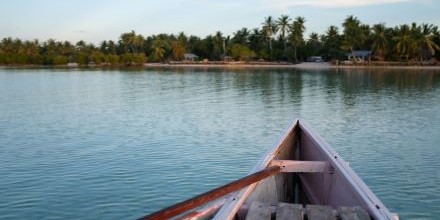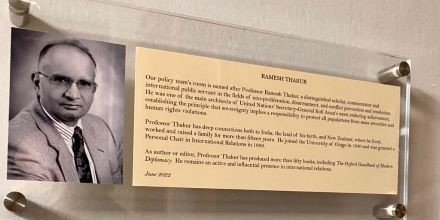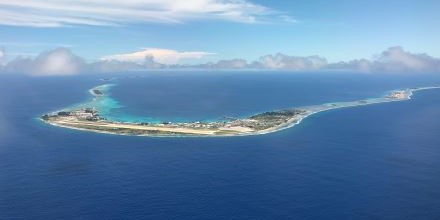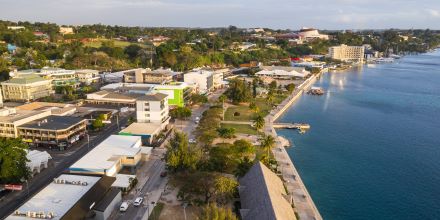Archive News & Announcements - 2022
Kiribati Embarks on 'Island Raising' Plan
Dec 2022 - Policy Brief
An ambitious plan to raise parts of the islands of Kiribati by up to five metres to combat rising sea levels could cost billions of dollars. Former President Anote Tong, who has backed the idea for years, says it may be the country's only hope of keeping its sovereignty. Others are not convinced that this is the answer. Listen to a full report from ABC Radio Australia. (Duration: 4'46) Image: Kate Jean Smith, UNDP/Flickr
Ramesh Thakur Honoured by NZ High Commission in India
Dec 2022 - Policy Brief
The New Zealand High Commission in New Delhi, India, decided to name their Policy Room after someone with intimate links to both New Zealand and India, who had made a significant contribution to the development of New Zealand foreign policy and/or international policy. Although Toda Senior Research Fellow Ramesh Thakur has Australian citizenship acquired after he move to the Australian National University, he worked at the University of Otago for 15 years (1980–1994) and was officially in the UN system as a NZ national. The total number of names that were considered by the NZ High Commission in New Delhi is not known, but Professor Thakur's name was in the mix and the staff collectively chose him to be so honoured. We assume the selection was then cleared by the Ministry of Foreign Affairs in Wellington. The plaque was put up in June. Professor Thakur was in Kathmandu for a conference in late November and travelled from there to New Delhi, at his own expense, specifically and solely for the purpose of the formal unveiling on 27 November, at which the High Commissioner HE Mr David Pine officiated. Images: Supplied
Before It Is Lost
Nov 2022 - News
Toda's community and readers are very familiar with the impact of climate change in the Pacific. Toda has been researching and writing on this issue, and working with Pacific communities and partner organisations to amplify Pacific voices as they tell their stories to the world. Recently, UK newspaper The Guardian has run a series of essays from the Pacific islands about what might be, can't be and has already been lost to the climate crisis. Featured in this series are writers Kate Lyons on Tuvalu, Julian Aguon on Guam, Kathy Jetnil-Kijiner on Marshall Islands, Katerina Teaiwa on Banaba, and Lagipoiva Cherelle Jackson on Samoa. You can find the essays here. Image: Kwajalein Atoll, Marshall Islands - Edpats/Shutterstock
Vanuatu's Bid for Climate Justice at the ICJ
Sep 2022 - News
Two recent reports from ABC Pacific update Vanuatu's bid to take climate justice to the International Court of Justice. Vanuatu closes in on push to take climate justice to international court Vanuatu says it has the support of a majority of UN General Assembly members to take climate justice to International Court of Justice. Listen to the full report. Vanuatu claims overwhelming support for United Nations climate justice bid Vanuatu says it has the numbers at the United Nations General Assembly to get climate justice in front of the world's highest court. The Pacific nation has been leading a campaign to get the International Court of Justice to issue an opinion on the right to be protected from climate change. If a majority of the UN General Assembly's 97 states to vote in favour of the resolution, the body would then refer the matter to the ICJ. Listen to the full report. Image: Asia Travel/Shutterstock
President Ikeda’s Statement Urges No First Use Policy
Jul 2022 - News
On July 26, 2022, Toda Peace Institute's Founder, Daisaku Ikeda, issued a statement to the 2022 NPT Review Conference calling for “No First Use” of nuclear weapons. In the statement, he strongly calls on all states parties to seize the opportunity of this NPT Review Conference to include in the Final Document commitments to a policy of No First Use by the nuclear-weapon states, support for this principle by all states parties and the extending of negative security assurances to all non-nuclear-weapon states, thereby promoting the transition to a new security paradigm. Seventy-seven years have passed since the atomic bombings of Hiroshima and Nagasaki, and not only has there been a lack of any concrete progress toward nuclear weapons abolition but the risk that nuclear weapons will actually be used has risen to the highest level since the end of the Cold War. President Ikeda states that nuclear weapons must never be used, and it is imperative that effective measures be taken to prevent this dire eventuality. Please find the full statement from SGI President Daisaku Ikeda here. Image: Romolo Tavani/ Shutterstock




